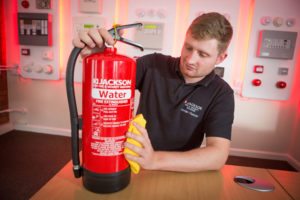As ou r engineers are out and about visiting customers, they get asked a lot of fire and security questions. They are always very happy to answer them in person but we thought it might be helpful to tackle some of the most frequently asked ones in our articles over the next few months as well. This month we’re starting off with how long fire extinguishers actually last and how often a fire extinguisher inspection should be carried out.
r engineers are out and about visiting customers, they get asked a lot of fire and security questions. They are always very happy to answer them in person but we thought it might be helpful to tackle some of the most frequently asked ones in our articles over the next few months as well. This month we’re starting off with how long fire extinguishers actually last and how often a fire extinguisher inspection should be carried out.

 r engineers are out and about visiting customers, they get asked a lot of fire and security questions. They are always very happy to answer them in person but we thought it might be helpful to tackle some of the most frequently asked ones in our articles over the next few months as well. This month we’re starting off with how long fire extinguishers actually last and how often a fire extinguisher inspection should be carried out.
r engineers are out and about visiting customers, they get asked a lot of fire and security questions. They are always very happy to answer them in person but we thought it might be helpful to tackle some of the most frequently asked ones in our articles over the next few months as well. This month we’re starting off with how long fire extinguishers actually last and how often a fire extinguisher inspection should be carried out.
How long does a fire extinguisher last?
UK fire extinguisher regulations recommend that fire extinguishers should be replaced every 5 years or given an extended service at that point. CO2 fire extinguishers should be replaced every 10 years. But obviously, there are caveats. Fire extinguishers need to have been maintained in good working order. That includes both the monthly visual checks and the annual fire extinguisher inspection by a competent fire extinguisher engineer (more on that below). No extinguisher should be more than 20 years old. It also doesn’t apply if the fire extinguisher has been damaged, or is unusable in any other way. In that situation, it needs to be replaced or serviced immediately. And clearly if it has been discharged it will need to be replaced straight away.
How often should a fire extinguisher inspection be carried out?
Monthly fire extinguisher inspections
You need to do a monthly visual fire extinguisher inspection and here are some of the things you need to look out for:- A cracked, torn or blocked hose or nozzle
- Broken or missing locking pins, seals and tamper indicators
- A wobbly or broken handle
- A missing service label. Ensure labels and tags on fire extinguishers are legible and if the service took place over 12 months ago, get one arranged straight away. Don’t forget to record your monthly inspections too.
- Visibility of fire extinguishers – check they are unobstructed and have clean, legible operating instructions facing outwards.
- Make sure the pressure dial on the fire extinguisher is pointing to the green, and lift the extinguisher to check it feels full.
- Any other signs of damage including corrosion or leakage or any signs that the fire extinguisher has been tampered with.
